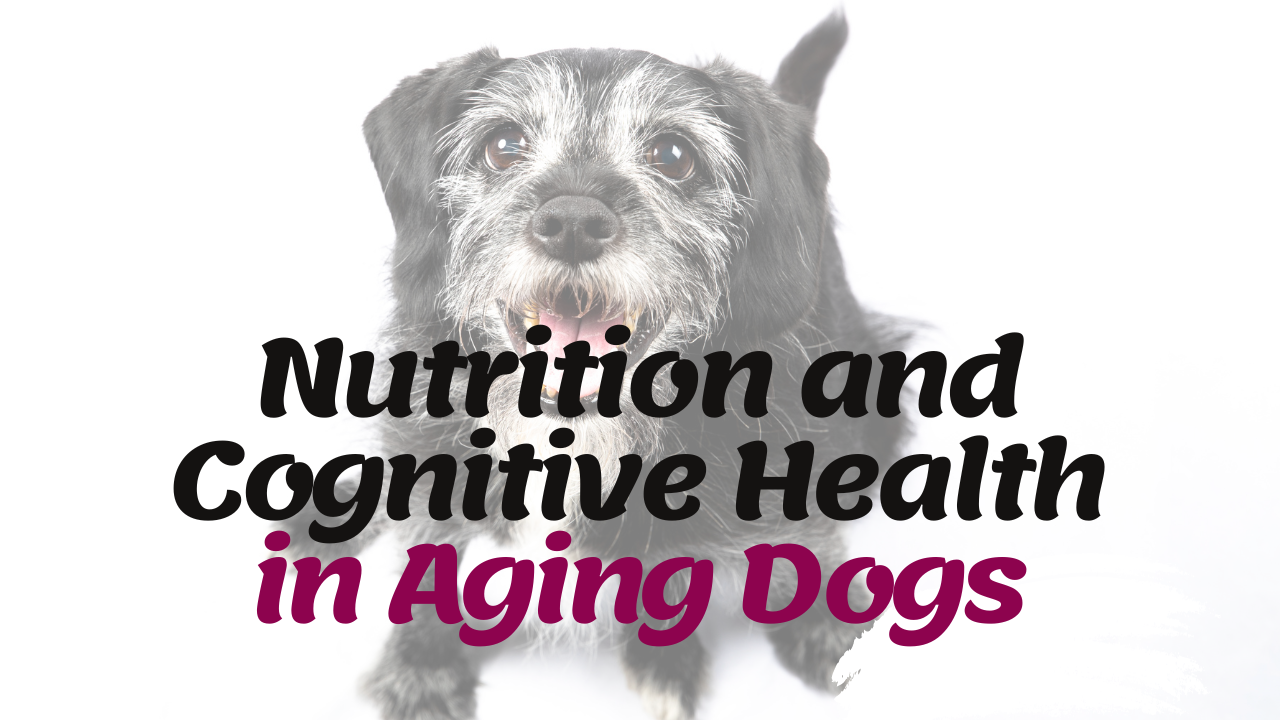Just like us, our beloved pups experience changes as they get older, and their brains are no exception. Let’s explore how the right nutrition can keep their minds sharp and tails wagging!
Understanding Canine Cognitive Dysfunction (CCD)
As our dogs age, they may experience a decline in cognitive functions, known as Canine Cognitive Dysfunction (CCD). This condition is akin to dementia or Alzheimer’s disease in humans. CCD can manifest through:
- Disorientation: Getting lost in familiar places.
- Altered Interactions: Changes in social behaviour with family members and other pets.
- Sleep-Wake Cycle Disruptions: Increased activity during the night and excessive sleeping during the day.
- House Soiling: Forgetting previously learned house-training skills.
- Decreased Activity: Loss of interest in playing or going for walks.
Recognizing these signs early can help us take steps to support our aging companions.
Key Nutrients for Cognitive Health
The brain requires specific nutrients to function optimally. Here’s a closer look at the key nutrients that can help support cognitive health in aging dogs:
Omega-3 Fatty Acids
Importance: Omega-3 fatty acids, particularly DHA (docosahexaenoic acid) and EPA (eicosapentaenoic acid), are crucial for brain health. They support neuron structure and function, and have anti-inflammatory properties.
Sources: Fish oils (such as salmon oil), flaxseed oil, and algae-based supplements.
Dosage: Aim for 100-200 mg of combined DHA and EPA per 10 pounds of body weight daily. Consult your vet for specific recommendations.
Antioxidants
Importance: Antioxidants combat oxidative stress, which can damage brain cells. They help protect the brain from free radical damage and support overall cognitive function.
Sources: Blueberries, spinach, kale, and supplements containing vitamins E and C.
Dosage: Follow your vet’s guidance. For example, vitamin E dosage might range from 100-400 IU daily depending on the dog’s size.
B Vitamins
Importance: B vitamins, especially B6, B12, and folic acid, are vital for brain health. They play roles in energy production, neurotransmitter function, and reducing homocysteine levels (high levels are linked to cognitive decline).
Sources: Liver, meat, eggs, and green leafy vegetables.
Dosage: Ensure a balanced intake through diet; consider B-complex supplements if necessary.
Phosphatidylserine
Importance: Phosphatidylserine is a phospholipid that helps maintain healthy cell membranes and supports neurotransmitter function. It has been shown to improve memory and cognitive function in dogs.
Sources: Typically found in specialized supplements.
Dosage: Studies suggest 50-100 mg daily for small to medium dogs and 100-200 mg for larger dogs. Always consult with a vet before starting new supplements.
Medium-Chain Triglycerides (MCTs)
Importance: MCTs provide an alternative energy source for brain cells. They are metabolised into ketones, which can be used by the brain for energy, potentially improving cognitive function in older dogs.
Sources: Coconut oil and MCT oil supplements.
Dosage: Start with small amounts (about 1 teaspoon per 10 pounds of body weight) and increase gradually to avoid digestive upset.
Superfoods for Cognitive Health
Incorporating certain foods into your dog’s diet can offer additional cognitive benefits:
- Salmon: High in omega-3 fatty acids, especially DHA.
- Blueberries: Rich in antioxidants.
- Pumpkin: Contains fiber and beta-carotene.
- Sweet Potatoes: Packed with vitamins A and C.
- Eggs: Provide high-quality protein and B vitamins.
- Broccoli: Contains antioxidants and fiber.
Supplements: Targeted Support
In addition to dietary changes, certain supplements can provide targeted support for cognitive health:
- Fish Oil Supplements: Ensure they contain both DHA and EPA.
- Multivitamins: Choose those formulated for senior dogs to cover any nutritional gaps.
- Cognitive Health Supplements: Look for products that include phosphatidylserine, antioxidants, and other brain-boosting nutrients.
Hydration: The Overlooked Essential
Proper hydration is critical for cognitive function. Dehydration can lead to confusion and lethargy. Always ensure your dog has access to fresh, clean water. You can also include moisture-rich foods like wet dog food or broth.
Lifestyle Factors: Beyond Nutrition
While nutrition plays a vital role, cognitive health in aging dogs also benefits from:
- Regular Exercise: Keeps the brain and body active.
- Mental Stimulation: Interactive toys, puzzle feeders, and training sessions.
- Social Interaction: Time spent with family members and other dogs.
- Routine Veterinary Check-Ups: Monitor health and adjust dietary needs as necessary.
Final Thoughts
Supporting the cognitive health of our aging dogs requires a comprehensive approach that includes the right nutrition, supplements, hydration, and lifestyle factors. By paying close attention to their dietary needs and overall well-being, we can help our furry friends maintain their mental sharpness and enjoy their golden years.
I’d love to hear your experiences! Have you implemented any of these strategies with your aging dog? What changes have you noticed?

